- Home
- Annette Blair
Skirting the Grave Page 11
Skirting the Grave Read online
Page 11
“Point them out to me this weekend, will you, so I can thank them.”
“I will, because that carousel has elevated your Carousel of Love garden party, vintage car show, and hunk auction, to fantasmagloriously unique. Plus I’ve got models in fifties dress to complement the cars, like in the fifties when they revealed a year’s new line. The models’ll walk around cars indicating their features, and they’ll have the cars’ stats to answer questions. With convertibles, the model will sit up on the back like in a fifties parade. Ticket sales are booming.”
“You don’t mind if I stay with Cort, do you, Mad?”
“I think it’s a splendid idea, Sis.” Yay.
“Dad,” Brandy cajoled. “You know Mad and I will get along better if we don’t live in the same house.”
“You win,” my father said. “But you’re not going to Cort’s tonight?”
“I’m bushed from fighting off a King Kong type who wanted me to move my paperwork so he could sit beside me in an otherwise empty train car.”
“What do you mean, a King Kong type?” I asked, my sleuthing radar going up.
“First he steps into the train car like I’m the one he’s looking for, then he zooms in like I’m carrying international secrets.”
“What did he look like?”
“A Neanderthal. Wide shoulders, beefy hands, hairy knuckles, heavy beard. A thug. Made me nervous, I’ll tell you, though I think the conductor read my body language, because he came through often enough.”
All I could think about were the phone calls as I backed out of the train station parking lot, but I didn’t expect one could use a voice modulator on the run. Even if it was the same person, how would he know Brandy could lead him to Isobel? “Did he get off here in Mystic?” If so, I needed to call Werner.
“I have no idea.”
“I’m taking you both home,” I told Brandy and my dad, “then I’m going to see Werner about the train thing. Dad, you and Isobel can fill Brandy in on what’s been happening the past two days.” I could have just called Werner, but I wanted to see if he had other information on the case, and I knew I had a better shot in person.
“Will do,” my father said.
“Is Isobel staying at our house?” Brandy asked.
“Yes, she’s resting right now. We didn’t get a lot of sleep last night,” I said, an understatement and a half.
I dropped them at my dad’s house and didn’t get out of the car. As soon as Aunt Fiona opened the front door and hugged Brandy, I pulled away.
I wondered if the hairy-knuckled Neanderthal and Isobel’s threatening caller were one and the same person. My eyes welled up at the thought of either of them being that close to my sister. Though just because my caller sounded like a Neanderthal didn’t mean it wasn’t a blue-haired granny.
I made a stop for hot, clear broth at the nearest deli and drove over to Nick’s.
I found him in bed. “Wow,” I said, hands on my hips. “Nothing subtle about you.”
He opened his arms.
I placed a quart of hot soup in one of his hands.
He jumped from the bed, set it on the nightstand, and gave me a frown.
I handed him a straw. “Now, sip.”
In a pair of navy boxers, chest bare, he sat in his leather reading chair and did as he was told.
I threw an afghan over him, paced, and told him about the techno caller and the guy who accosted Brandy on the final leg of her train trip. I told him about the day she was supposed to leave and the caller who said she needed to re-sign her termination papers for the Peace Corps. How her backpack got snatched on that wild goose chase, causing a coincidental loss of her ticket. Linked to Isobel’s ID going missing, I told him about Payton’s death on the train Brandy missed, and Payton having Isobel’s ID. And I told him about my psychometric visions on the boat and as a carhop. It was so nice to be able to share that. “Am I wrong to be nervous?”
He had long since stopped sipping his soup and now sat straight up.
He pulled a notepad over and scratched something on it: “Why tell me?”
“Because you’re my go-to guy.”
He scribbled a reply. “Hold that thought. Now go tell Werner what you told me, except for the visions.” He used one of his hands to form a gun and mimed shooting himself in the head.
I kissed him on the brow, lost my breath at the way he looked at me—hunger and something more in his expression. The way my father looked at Fiona. Oy.
Again, why me?
He held out the notebook so I could read what he added in caps: “LISTEN TO YOUR GO-TO GUY.”
Twenty-one
I never cared for fashion much, amusing little seams and witty little pleats: it was the girls I liked.
—DAVID BAILEY
Two more quick stops, then I took the direct route to the police station.
I hovered in Werner’s doorway, and he looked up from his work. “Oh no,” he said.
“You want me to leave?” I turned to go on my saucy red Louboutin follow-me heels.
“Wait. Have you come to strip for me again?” He looked me up and down. “Please say yes.”
“Perv.” I’d changed into Grand-mère’s fifties white with red polka dots and cummerbund. I half expected it to give me a psychometric reading, but I guess it just didn’t have anything to say; not this particular piece, anyway.
For Werner’s benefit, I twirled so the dress would flare, one of my favorite moves in a gathered skirt since I could walk. “It’s from the fifties; I wore it in honor of our mutual love for fifties music.”
He chuckled. “Until today, I didn’t know we shared a mutual love for fifties music. It’s not something I usually admit.”
“I love the decade, which is why I talked Brandy into making her upcoming fund-raiser a fifties event. Pure luck or karma brought that trunk to my door in the middle of fitting everyone for the do.”
“I thought Isobel brought that trunk to your door.”
“Essentially, she did.”
Werner ran a hand through his hair. “It makes me nervous to think that karma might have had anything to do with you falling half-naked into my arms this morning.”
“I’d be nervous about it, too,” I admitted, “if karma had anything to do with, well, us.”
“So you understand my reaction? You’ve assaulted me in every way possible—including my senses—at one time or another. If karma had anything to do with it, I’d have to start wearing armor.” He rubbed at his five o’clock shadow. “Just saying it out loud is like tempting fate.”
I shrugged and tried to keep my mouth shut, though my mind raced as I thought of the ways fate had thrown us together, and just to scare him, I allowed him to see the twinkle in my eyes.
“You feel okay?” he asked. “Not nauseous or anything?”
“I’m not planning to barf on you, if that’s what you mean. But thank you for holding my hair back this morning. Not that I remember.”
“Blocking it myself, thanks.”
See, when I passed out, I took this trip to the nineteen-fifties. Yeah, he’d buy that. “Too much chocolate,” I said.
“I’m a detective; I knew that right away.”
I hiccupped an involuntary chuckle as I opened my grocery bag and set a bottle of Dos Equis in front of him.
“You already sound drunk,” he said. “Close my door.” He had an eye twinkle of his own that I’d come to appreciate, one I often tried to elicit.
I closed his door, then I set down the six-pack and took one of our favorite Mexican beers for myself.
“Your tummy okay?” he asked. “You sure you’re up to this?”
“Watch me and find out. So, do we have cause of death yet?”
“No, we don’t. I probably never told you, but in ninety-five percent of deaths, the autopsy will reveal cause of death on the same day.”
“And the other five percent?” I asked, confused.
“The only time you have to wait weeks for a cause
of death is with a toxicology report tied to drug use.”
“Your forensics lab found drugs?”
“It looks like she’s a recreational user, an experimenter. Plus the medical examiner did find one fresh needle mark, but it didn’t lead to anything definitive.”
“You know, Isobel implied that her sister and cousin got into trouble, and it made me assume drug use.”
“You know what assumptions are worth.”
“I know,” I said. “How about time of death? Do we know when she died?”
“She had to have died on that bench while the ambulance was on its way to her. The tip came from an anonymous 911 call. We’re thinking a disembarking passenger saw her on the bench.”
“So this isn’t an FBI case? Though Nick’s case is somehow entangled.”
“Yes. No. Maybe. He’s looking at some of the same players, big embezzlement case. Repeat that to Nick, and I’m toast. But this case is all ours. I mean, all mine.”
I hid my satisfaction, but in my heart I did a happy dance. He was beginning to accept my sleuthing. He hadn’t once said, “I can’t discuss the case,” or “Madeira Cutler, are you sleuthing again?”
I cleared my throat. “Next step, then?”
“The deceased will be on her way to the nearest forensics lab in the morning.”
As Nick suggested, I told Werner about Isobel’s deep-voiced caller saying she should be dead. I also told him about Brandy’s train car gorilla.
Werner took notes as quickly as I could talk, though I noticed that he didn’t turn on his recorder the way he had with Isobel’s father earlier.
“You’re good at that. Can you read what you wrote?” I turned his notebook my way.
He turned it back his way. “I can read it, but I’m the only one who can.”
“The only one who’s allowed?”
He kept an end table–sized fireproof floor safe behind his desk—a stack of crime and investigative technique books on top. He reached over and swung the door open.
Inside, stacked, bound notebooks were topped by index cards with years, months, and case names.
“Ever heard of a database?” I asked. “Eve could set you up with a beauty.”
“Got one, thanks. But I like to have a personal relationship with my cases. Notes remind me of an interviewee’s facial expressions, the way some women cross their legs to distract you when they’re lying.”
I admired the wool gabardine out of him for his distinctive techniques. “It looks like those notepads only date back to January. Where does your secret decoder ring stash go from here?”
“That’s classified, and you don’t have a ring.”
I raised my Dos Equis, and we clicked bottles.
“Here’s to suspects,” he said.
I raised my chin and looked him in the eye. “Got any?”
He tapped his notebook on his desk a couple times. “Definitely a few suspicious characters.”
I batted my lashes. “I have a list, too.”
“So we each have a list.” The detective sipped his beer, his bright gaze boring into mine over the mouth of the bottle.
He swallowed and raised his chin. “Show me yours, I’ll show you mine.”
Twenty-two
Where’s the man could ease a heart like a satin gown?
—DOROTHY PARKER
“I’m up for another bottle while I tell you about Isobel’s freaky family. You?”
He nodded. “Every family is freaky. Even yours.”
“Oh, especially mine. You don’t know the half of it. My mother was a witch.”
“Hah!” he said. “Mine still is.”
We sipped our beer contemplatively for a minute, and I decided this wasn’t the time to tell Werner I wasn’t kidding about my mother, but I did recount what I’d learned about Isobel’s unusual family.
Werner stopped writing and looked up as I opened another beer. “Then what?
“Then you showed up to keep me from puking into a trunk of primo vintage and killing a Dior mink.”
“Right.” He winced. “Tryin’ to forget that.” He sat back and steepled his fingers. “I’m not sure about the campaign manager,” Werner said. “I don’t trust a guy with so much clout, especially when it’s somebody else’s power. I’m waiting for his financials.”
“Ruben Rickard. Isobel described him as her father’s cutthroat protector,” I said. “He’s on my suspect list, too. I’ll see if I can learn anything more about him.”
“Who else is on your list?” Werner asked.
“Madame Robear.”
“I guessed as much. But being voluptuous is no crime, Mad.”
It is to those of us with average boobage. “Your peeps need to get a better timeline. Finding Robear on a train coming this way, hours after the murder, is a little too coincidental for me.”
Werner marked “Robear’s timeline” in his notebook. “Who else is on your list?” he asked, not bothering to argue my point.
“The candidate’s mother, Payton’s grandmother. They call her Grand-mère. Gets chauffeured around town in a powder blue stretch limo. She’s here in Mystic, checking on her granddaughter. She was in my shop before I went to pick up Isobel at the station. I just didn’t know then that it was her.”
“I find that hard to swallow,” Werner said. “Who’d kill a grandchild?”
“Who’d kill their own child? But it happens every day, right? Instead of Grand-mère, let’s call her a pushy, aggressive woman determined to see her son in the White House. A woman who’d do anything for power, even assuming her intentions were pure and she had her family’s or her country’s best interests at heart.”
“Kill a grandkid, save a country?”
“Well, when you put it that way. Actually, I was thinking of sacrifices for the greater good, but in this context, it sounds trite and skewed, even to me.”
“For argument’s sake, what’s Grand-mère’s motive?”
I tapped my chin. “Isobel said she’d do anything to get her son elected. So, power, greed, personal aggrandizement—his station would raise hers. Check into her financials, why don’t you?”
“Will do.”
“Now,” I said, sitting forward, “suppose the granddaughter of a woman like that did something morally reprehensible, which could destroy her son’s chances at getting elected—as in lousy father, lousy . . . name the office. Would that be motive enough?”
Like maybe Payton had been standing on that boat. Should politicians have call girls in the family? Should they have carhop-working girls for mothers?
Werner sharpened his pencil with an electric sharpener and blew on the tip as if he’d fired it like a gun. “Wouldn’t Grand-mère’s embezzling son have ruined his brother’s chances of being elected, anyway?” Werner suggested. “I mean, no matter what the grandchildren did?”
“Not if the honest, upright candidate was the one who turned in the embezzler.”
Werner placed the flat of his hands on his desk and leaned toward me. “Your mind’s too busy. What are you not telling me?”
“Is this Nick’s embezzlement case? Is Patrick York not the embezzler? Does it go higher up than that?”
Werner sort of growled low in his throat.
“Nuff said. But I’m working on instinct, here.” And my secret psychic ability. “You’d understand if you heard Isobel talking about Grand-mère. She’s powerful, she’s rich, judging by her discarded Dior mink, plus she owns an island, Kingston’s Vineyard, with which she plans to outshine Martha’s Vineyard. Oh, and she thinks her son, Isobel’s father, is the second coming of JFK.”
“Sounds like she’s a few vines short a vineyard.”
“Judging by what Isobel didn’t say, I think Grand-mère can be scary. How about Isobel’s uncle?” I asked. “Is he still in prison?”
“He is,” Werner said. “He needed to be told about his daughter, so I did some investigating before I made the call. The money he embezzled was never found. Maybe Payton knew
where it was, and her killer was after her for it?”
“In which case, she might have needed to hide behind her cousin Isobel’s identity,” I suggested.
“Actually,” he said, “that’s a better reason for the killer to plant Isobel’s ID on Payton than to make Payton a target. I mean, who asks for your ID before they kill you?”
Twenty-three
Fashion is an art. You express who you are through what you’re wearing.
—DANIELE DONATO
“Right,” I said. “They kill you first and ask for your ID later. Give that man a cigar.”
Werner rubbed his earlobe, looking pleased with himself. “Don’t mind if I do.” He grabbed a cigar from his desk drawer.
“Give me that.” I plucked it from between his lips and snapped it in half. “Smoking kills.”
He looked like a pup that lost his meaty bone. Ah, shouldn’t put Werner and meaty bone in the same thought.
“Do you know how much that Cuban cost?”
“Word for word, the perfect epitaph for your headstone. ‘Do you know how much that Cuban cost? My life.’”I leaned slowly over his desk, so he’d focus on my cleavage, and while his gaze was otherwise occupied, I raided his cigar drawer, breaking all three Cubans into pieces too small to smoke.
His jaw dropped.
I raised it with a finger. “I wouldn’t have done it if I didn’t care. Now, where were we?” I dropped the pieces into his wastebasket, dusted my hands together, and sat down. “Power and money are good motives, and they often go hand in hand. What happened to the money Patrick York stole?”
“Right. Marry the two motives,” he said, “and you have almost everything anybody could want.”
“Well, they could want revenge.” I took a long sip of beer. “Suppose Payton was killed to get back at her father for the money he stole? Who did he steal it from?”

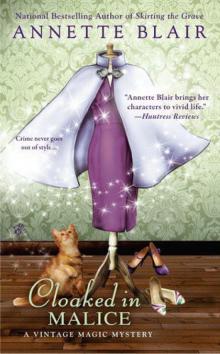 Cloaked in Malice
Cloaked in Malice UNFORGETTABLE ROGUE (The Rogues Club, Book Two)
UNFORGETTABLE ROGUE (The Rogues Club, Book Two) Unmistakable Rogue
Unmistakable Rogue Butterfly Garden
Butterfly Garden Jacob's Return
Jacob's Return Vampire Dragon
Vampire Dragon A Winter Heart, Sexy Amish Historical Novella
A Winter Heart, Sexy Amish Historical Novella Scandalous Brides
Scandalous Brides Untamable Rogue (Formerly: A Christmas Baby)
Untamable Rogue (Formerly: A Christmas Baby) Captive Scoundrel
Captive Scoundrel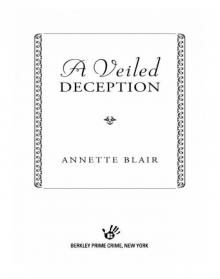 A Veiled Deception
A Veiled Deception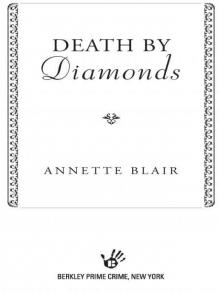 Death by Diamonds
Death by Diamonds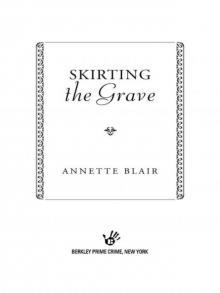 Skirting the Grave
Skirting the Grave Sex and the Psychic Witch
Sex and the Psychic Witch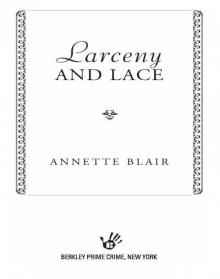 Larcency and Lace
Larcency and Lace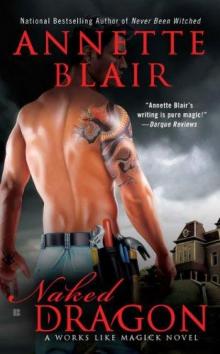 Naked Dragon
Naked Dragon Undeniable Rogue (The Rogues Club Book One)
Undeniable Rogue (The Rogues Club Book One) Proper Scoundrel
Proper Scoundrel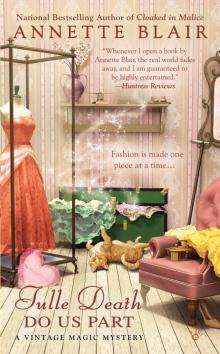 Tulle Death Do Us Part
Tulle Death Do Us Part